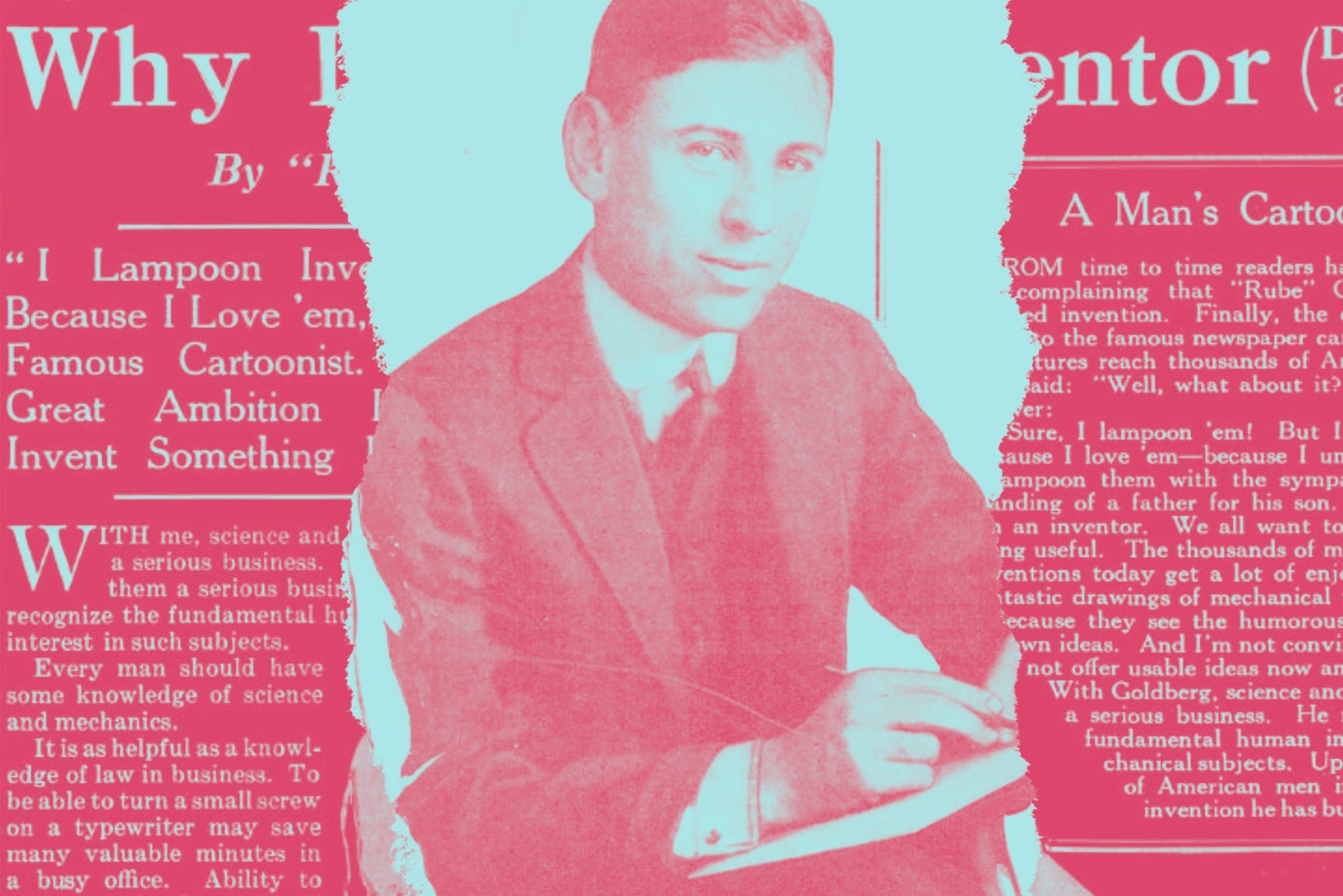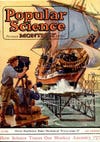From the archives: Rube Goldberg machines are serious business
In the June 1923 issue of Popular Science, Rube Goldberg himself writes that he hopes to 'invent something useful.'

To mark our 150th year, we’re revisiting the Popular Science stories (both hits and misses) that helped define scientific progress, understanding, and innovation—with an added hint of modern context. Explore the entire From the Archives series and check out all our anniversary coverage here.
Before the name Rube Goldberg became synonymous with comically over-engineered chain-reaction contraptions that satirize technology, the eponym belonged to a humble engineer turned cartoonist. Born in 1883, Reuben Lucius Goldberg lived long enough to watch the world transform from horse-and-buggies to lunar landers. “We all want to invent something useful,” Goldberg claimed in a humorous but thoughtful piece for Popular Science in June 1923.
In 1923, Goldberg, who’d earned a degree at UC Berkeley’s College of Mining and had taken jobs as a sewer designer and a sportswriter, was already a famous and well-compensated New York cartoonist. “My knowledge of science and mechanics is largely responsible for my progress as a cartoonist,” he wrote in Popular Science, feeling compelled to defend his work and affirm his love of engineering and invention.
In his own words in 1923—and without the benefit of knowing that he would have another nearly half century of cartooning before him—Goldberg lamented, “I still have hopes of inventing something useful.” In hindsight, however, it becomes clear that Goldberg’s keen lens—which he used to comment on everything from nuclear weapons to World War II—was his most useful invention. At a time when technology often seems to have run amok, precariously tilting the scales of society and politics, we could use that perspective.
“Why I am an inventor (Do I hear a laugh?)” (Rube Goldberg, June 1923)
“I lampoon inventions because I love ’em,” says famous cartoonist. His great ambition is to invent something useful.
With me, science and invention are a serious business. I have made them a serious business because I recognize the fundamental human interest in such subjects.
Every man should have some knowledge of science and mechanics.
It is as helpful as a knowledge of law in business. To be able to turn a small screw on a typewriter may save many valuable minutes in a busy office. Ability to remedy a simple matter of ventilation may speed up the work of an establishment. Then the knowledge of some scientific principle may enable a man to put a new and useful product on the market—may make him rich.
He’s a mechanic
My knowledge of science and mechanics is largely responsible for my progress as a cartoonist. When I was studying mining engineering at the University of California, I took up analytical mechanics. I was introduced to a machine, invented by one of the professors, used to determine the weight of the Earth.
This machine amused me, as it did every other student in the class, and I began to draw pictures of machines of my own that I thought were useless. These fantastic drawings were the beginnings of my career as a cartoonist.
Practically every American man likes to work with tools. I have this leaning toward mechanics and I have taken it into my work. The response has surprised me. It has proved to me that we are living in an age of science and mechanism.
One of my useless inventions was a mechanical music turner. Every bashful man who has had to stand up before visitors and turn music for his wife or sweetheart will sympathize with my attempt to do away with this embarrassing nuisance. My idea was to have a foot pedal connecting with an arm for turning the pages. Of course it has not been put on the market. But may be, some time, it will be.
The average man dislikes to carry an umbrella. Many throw them away as soon as it stops raining. Once I conceived the idea of inventing a folding umbrella that could he put in the pocket when not in use. It has never been perfected, but I still think it is a good idea.
Do I hear a loud laugh?
I have taken my place also among the thousands of Americans who have dreamed of a non-skid device for automobiles. My idea was to have a fifth wheel equipped with chains that could be dropped to the pavement beneath the car. I was surprised to find that two others had had the same idea before me.
The thousands of men working on inventions in the country today get a lot of enjoyment seeing fantastic drawings of mechanical things. Why? Because they see the humorous side of many of their own ideas. and I’m not convinced that I do not offer usable ideas now and then. Even the man who has not tried his hand at invention generally has a home workshop. What is the first thing he shows a visitor? Usually it is some little contrivance he has rigged up. He is proud of it because it shows he has some knowledge of mechanics. And he is always ready to laugh at one of my crazy mechanical cartoons.
When a child breaks a toy, it is up to the father to fix it, or lose his reputation. A cartoon on the subject is good for a laugh in nearly every American home.
And what man hasn’t had the idea of inventing something to automatically stoke, shake, and clean his furnace? Some elaborate contrivance for doing so, pictured in a cartoon, is sure to tickle him. Usually he is sport enough to laugh at his pet theories.
Crazy as some of my mechanical cartoons are, most of them are mechanically possible. The same is true of nearly every invention.
I still have hopes of inventing something useful. Perhaps I may yet come across the big idea in working out some of my foolish cartoons. The field is wide and strange things happen.

Some text has been edited to match contemporary standards and style.
